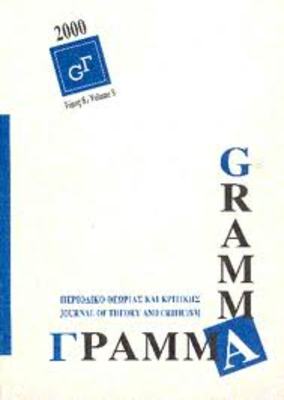"Scarers in Print" : Media Literacy and Media Practice from Our Mutual Friend to Friend Me On Facebook
Part of : Γράμμα : περιοδικό θεωρίας και κριτικής ; Vol.21, 2013, pages 163-179
Issue:
Pages:
163-179
Author:
Abstract:
In Charles Dickens's Our Mutual Friend, Noddy Boffin is surprised at what he finds in books, remarking that he didn't think "there was half so many Scarers in Print." This paper explores whether or not there are Scarers in Print. For Boffin, reading is unsettling as it turns books into containers, from which content can be liberated by those in the know. However, content is not contained within the book, but produced through an encounter with it. When readers read, the body of the book disappears in exchange for apparently resurrected content, packaged up and stored by the author. But what happens to the body of the book when it disappears? And under what conditions does it return? Taking in examples from nineteenth-century literature to Facebook, this paper explores this gothic economy of repression and return. Reading and writing are embodied practices: only a literacy that encompasses materiality—what readers do, rather than what they read—can account for the Scarers in Print
Subject:
Subject (LC):
References (1):
- Brooks, Peter. Reading for the Plot. 1984. Cambridge, MA: Harvard University Press, 1992. Print.Brown, Bill. "Thing Theory "Critical Inquiry 28 (2001): 1-22. Print.Dickens, Charles. Bleak House. 1852-3. London: Chapman and Hall, 1868. Print...... Our Mutual Friend. London: Chapman and Hall, 1865. Print...... "The Signal-Man." All the Year Round 16 (10 Dec. 1866): 20-25. Available in Dickens Journals Online. Web. 23 Dec. 2012 http://www.djo.org.uk/all-the-year-round/volume-xviFloridi, Luciano. Information: A Very Short Introduction. Oxford: Oxford University Press, 2011. Print.Freud, Sigmund. "The 'Uncanny'." The Uncanny. Trans. David McClintock. London: Penguin, 2003. 123-62. Print.Gallagher, Catherine. The Body Economic: Life, Death and Sensation in Political Economy and the Victorian Novel. Princeton, NJ: Princeton University Press, 2006. Print.Gleick, James. The Information: A History, a Theory, a Flood. London: Fourth Estate, 2011. Print.Hayles, Ν. Katherine. Writing Machines. Cambridge, MA: MIT Press, 2002. Print.Headrick, Daniel R. When Information Came of Age. Oxford: Oxford University Press, 2000. Print.James, M.R. "Casting the Runes." Count Magnus and Other Ghost Stories. Ed. S.T. Joshi. London: Penguin Classics, 2005. 158-79. Print...... "Oh Whistle and I'll Come to Thee." Ghost Stories of an Antiquary. London: Edward Arnold, 1905. 181-225. Print.Kern, Stephen. The Culture of Time and Space, 1880-1918. Cambridge, MA: Harvard University Press, 1983. Print"Key Facts." Facebook. 2013. Web. 1 June 2013 http://newsroom.fb.com/Key-Facts Kirschenbaum, Matthew G. Mechanisms: New Media and the Forensic Imagination.Cambridge, MA: MIT Press, 2008. Print."Kindle: Amazon's Original Wireless Reading Device (First Generation)."Amazon. 2007. Web. 23 Dec. 2012 http://www.amazon.com/dp/B000FI73MA/"Kindle: Amazon's 6" Wireless Reading Device (Latest Generation)."^mazon. 2009. Web. 23 Dec. 2012 http://www.amazon.com/dp/B00154JDAI/Kucich, John. "Repression and Representation: Dickens's General Economy."Nineteenth-Century Fiction 38 (1983): 62-77. Print.Luckhurst, Roger. The Invention of Telepathy, 1870-1901. Oxford: Oxford University Press, 2002. Print.Mayer-Schönberger, Viktor. Delete: The Virtue of Forgetting in the Digital Age. Princeton, Ν J: Princeton University Press. Print.Miller, J. Hillis. The Medium is the Maker: Browning, Freud, Derrida and the New Telepathic Ecotechnologies. Brighton: Sussex, 2009. Print.Montfort, Nick. "The Early Materiality and Workings of Electronic Literature." Continuous Paper. Jan. 2005. Web. 7 June 2013 http://nickm.com/writing/essays/continuous_paper_mla.htmlMussell, James. "Elemental Forms: the Newspaper as Popular Genre in the Nineteenth Century." Media History 20 (2014): 4-20. Print...... The Nineteenth-Century Press in the Digital Age. Basingstoke: Palgrave, 2012. Print.Noonan, Catherine. "Could Your Facebook Page Ruin Your Job Prospects?" The Guardian. 5 Mar. 2012. Web. 7 June 2013.Nunberg, Geoffrey. "Farewell to the Information Age." The Future of the Book. University of California Press, 1996. 103-38. Print.Ong, Walter. Orality and Literacy: The Technologizing of the Word. London: Methuen, 1982. Print.Poovey, Mary. "Reading History in Literature: Speculation and Virtue in Our Mutual Friend." Historical Criticism and the Challenge of Theory. Ed. Janet Levarie Smarr. Chicago: University of Illinois Press, 1993. 42-80. Print.Price, Leah. How to Do Things With Books in Victorian Britain. Princeton, NJ: Princeton University Press, 2012. Print.Ronnell, Avital. The Telephone Book: Technology, Schizophrenia, Electronic Speech. Lincoln, NE: University of Nebraska Press, 1989. Print.Scoggin, Daniel P. "A Speculative Resurrection: Death, Money, and the Vampiric Economy of Our Mutual Friend" Victorian Literature and Culture 30 (2002): 99-125.Print.Sconce, Jeffrey. Haunted Media: Electronic Presence from Telegraphy to Television. Durham, NC: Duke University Press, 2000. Print.Stauffer, Andrew M. "Ruins of Paper: Dickens and the Necropolitan Library."Romanticism and Victorianism on the Net 47 (2007): n. pag. Web. 4 Oct. 2010.Steedman, Carolyn. "The Space of Memory: In an Archive."History of the Human Sciences U (1998): 65-83. Print.Terdiman, Richard. Discourse / Counter-Discourse: The Theory and Practice of Symbolic Resistance in Nineteenth-Century France. NY: Cornell University Press, 1989. Print.Tilley, Heather. "Waste Matters: Charles Dickens's Our Mutual Friend and Nineteenth-Century Book Recycling." Book Destruction from the Medieval to the Contemporary. Ed. Gillian Partington and Adam Smyth. Basingstoke: Palgrave, 2014.152-72. Print.Weiler, Toni. The Victorians and Information: A Social and Cultural History. Saarbrücken:VDM Verlag, 2009. Print




